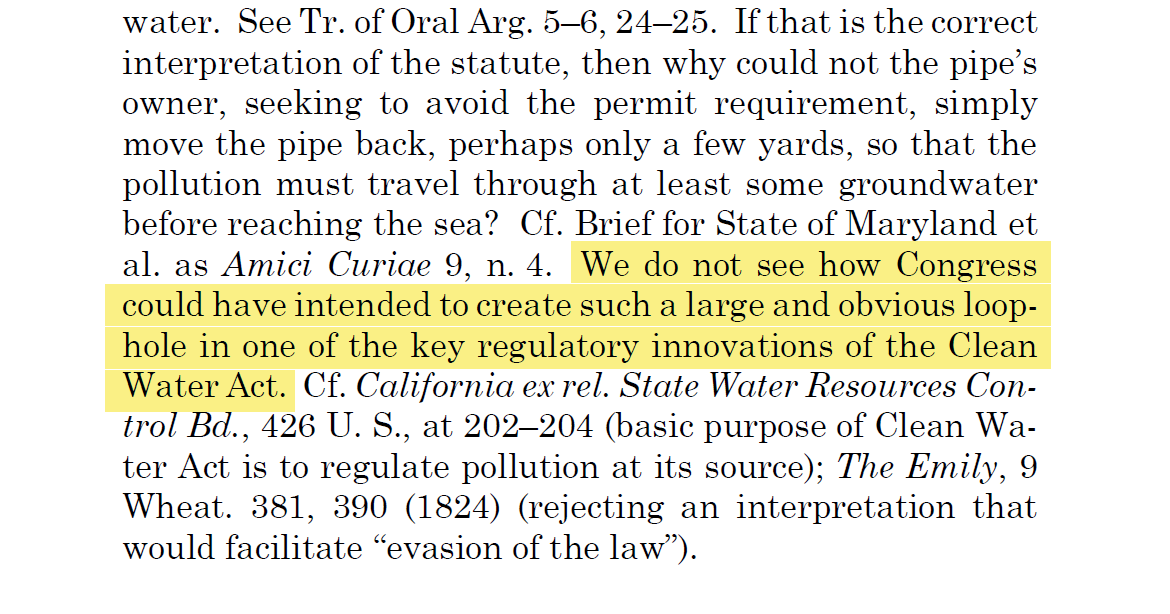Reflecting on our win today in County of Maui v. Hawaii Wildlife Fund at the Supreme Court. The Clean Water Act remains intact. But people might not know how close we came to disaster if the court went the other way.
Here& #39;s what happened and what this ruling means...
Here& #39;s what happened and what this ruling means...
We filed the case nearly a decade ago. It involves a wastewater treatment plant, its pollution discharges, and a partially dead coral reef caused by the pollution. We represented @wildhawaii, @SierraClubMaui, @Surfrider, & West Maui Preservation Asso. https://ejus.tc/2Y0m7w0 ">https://ejus.tc/2Y0m7w0&q...
The ailing coral reef is important, but the stakes were about more than that. @Scotus agreed to hear the case to weigh the County’s contention that unless a discharge pipe goes *directly* into an ocean, lake, or river, its pollution is not regulated by the Clean Water Act.
The County’s position was extreme. Under their view, a polluter could evade regulation by cutting their pipes a few feet short of a water body so waste flows indirectly into the water. This would blow a big hole in the Clean Water Act and allow for a lot of unchecked pollution.
The Trump admin wanted to blow a different hole in the law. Maui’s wastewater plant discharges sewage into groundwater, which flows to the ocean a quarter-mile away. A big issue in the case was whether pollutants that enter a water body through groundwater are covered by the Act.
For 30 years, the EPA held that pollution that flows to a water body through groundwater is covered by the Clean Water Act. During earlier proceedings in the case, President Obama’s EPA filed a brief supporting our position.
Then last year, Trump’s @EPA reversed decades of agency interpretation of the law--issuing guidance that pollution discharges into waters of the United States via groundwater are categorically excluded from Clean Water Act regulation. https://ejus.tc/3eKqjG0 ">https://ejus.tc/3eKqjG0&q...
So there was a real risk the Supreme Court could have decided with Trump’s @EPA or the County in blowing one of two gigantic holes in the Clean Water Act. The outcome would have ripple effects across the whole country. https://ejus.tc/2VwMhEL ">https://ejus.tc/2VwMhEL&q...
Big business waded into the case to support the Trump admin& #39;s arguments. A who’s who of polluters from the manufacturing, oil & gas, commercial agriculture, and mining industries all filed briefs. Among them Energy Transfer Partners, the corp. behind the Dakota Access Pipeline.
We had full confidence in our attorney, David Henkin, who argued the case brilliantly before the Court last fall. But with the stakes so high, and frankly a court that has never been that friendly to environmental cases, we’ve been waiting with bated breath for this decision.
Today, Justice Breyer penned the majority opinion which ruled 6-3 rejecting the Trump administration’s position, saying it would have created an “obvious loophole” in the Clean Water Act.
The court held that the Clean Water Act “require[s] a permit if the addition of the pollutants through groundwater is the functional equivalent of a direct discharge from the point source into navigable waters.” https://ejus.tc/3eVcAfM ">https://ejus.tc/3eVcAfM&q...
In other words, the Clean Water Act prohibits unpermitted discharge of pollution “into navigable waters, or when the discharge reaches the same result through roughly similar means.”
In the case of the Maui wastewater plant, tracer-dye studies show that the discharge from the plant clearly winds up in the ocean. https://www.youtube.com/watch?v=EXljda3O5Uw&feature=youtu.be">https://www.youtube.com/watch... https://www.youtube.com/watch...
While we will have to return to court for further proceedings, we fully expect Maui County’s sewage plant will be required to get a Clean Water Act permit as a result of today’s decision. That permit will require the County to clean up its pollution to protect the ocean.
It will protect the corals and ocean environment from the 5 million gallons of treated sewage being discharged everyday.
This opinion will lead to courts tackling on a case-by-case basis other circumstances where polluters discharge to water through groundwater. Others will use it to enforce clean water protections where pollution through groundwater can be clearly linked back to a source.
It’s stunning to think how close we came to a world where industries could just point their pipes straight down into groundwater to dispense of their pollution indirectly into clean water without repercussion.

 Read on Twitter
Read on Twitter





